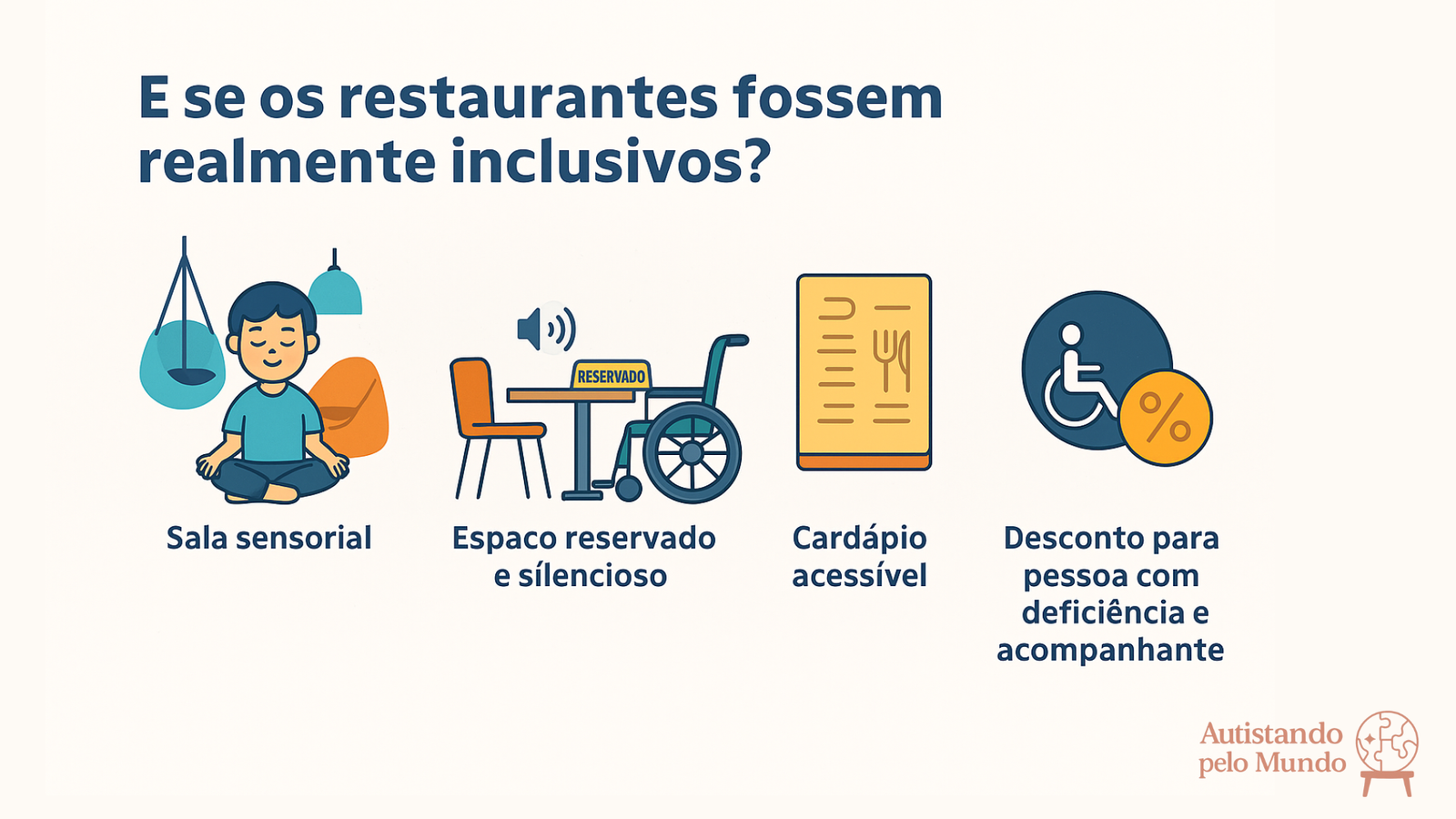🍽️ How Restaurants Can Be More Inclusive for Families with People with Disabilities
Going to a restaurant may seem simple for many families, but for those with autistic children or people with disabilities in the family, this experience can be challenging and even avoided. What should be a moment of leisure and connection often ends up becoming a source of stress, exclusion, and high expenses. Thinking about accessibility and inclusion goes far beyond ramps and adapted bathrooms. It's about creating truly welcoming environments for everyone. 💙
❓ Why is inclusion in restaurants so important?
Atypical families often face difficulties when eating out. Noisy environments, long waits, a lack of understanding from staff, a lack of basic accommodations, and high costs are just some of the factors that keep these families from socializing. Inclusion, in this case, isn't a differentiator—it's a necessity. ♿👨👩👧👦
💡 Simple ideas that make all the difference
With small changes, restaurants can become much more accessible and inclusive. Here are some suggestions that could transform the experience for many families:
- 🧘♂️ Sensory room: A calm, safe space with soft lighting and sensory materials where the autistic child or adult can regulate themselves if they feel overwhelmed.
- 🔇 Reserved and quiet space: Tables should be away from noisy or busy areas. Ideally, this space should not require advance reservations, respecting the unpredictability that many families face.
- 🪑 Adapted tables: Ensuring tables have adequate space for wheelchairs is essential to include people with reduced mobility.
- 📖 Accessible menu: Braille or audio versions, as well as menus with pictograms and simple language to facilitate understanding for people with visual or intellectual disabilities.
- 💸 Fair discount for companions: In many cases, people with disabilities require constant support. Offering discounts to both them and their companions makes the experience more financially viable and encourages social participation.
📌 An important reminder
We know that none of these measures are required by law. However, that doesn't mean they aren't important. On the contrary: for many atypical families, these details make all the difference between leaving home or not, between feeling welcomed or excluded.
🌟 Positive impact for everyone
By adopting inclusive practices, restaurants not only fulfill their social role but also expand their audience, strengthen their reputation, and demonstrate empathy. Families who feel welcomed become loyal customers, recommend the restaurant to others, and help promote a positive image of the establishment. 🙌
Furthermore, investing in accessibility can become a competitive differentiator. In a market where customer experience is increasingly valued, demonstrating genuine concern for all types of audiences is a smart and necessary strategy.
🏅 Real examples that inspire us
One of the most beautiful examples we found is the Vini's skewer, in Guaíba (RS). Created by the parents of an autistic boy, the restaurant was adapted to welcome other atypical families with great affection. 💚
They offer sensory room, noise-canceling headphones, adapted menus and even smaller meals for picky children. Furthermore, the environment is calm and full of accessible information about autism. Initiatives like this warm the heart and show that inclusion is possible! 🫶
We haven't been there in person yet, but it's on our list of places to go. we dream of visiting and appreciating. You can check out more about the project at Vini's Espetinho Instagram. 📲
And it's not the only one! Projects like PizzAut, a pizzeria founded with the goal of being inclusive for autistic people and their families, also demonstrates that it's possible to combine gastronomy and hospitality. Similar initiatives are beginning to emerge in Brazil—and we hope many more will follow! 🍕✨
🧏 Inclusion starts with listening and empathy
You don't need to have all the resources at once. The most important thing is to start by listening to families and people with disabilities. Asking questions, learning, and adapting are attitudes that demonstrate respect and a willingness to evolve. ❤️
True inclusion begins when we stop expecting people to adapt to the world and start adapting the world to people. 🌍
📢 Conclusion: an invitation to change
Restaurants can—and should—be places of gathering, joy, and sharing for all families. With empathy and practical actions, it's possible to transform the daily lives of many people who currently feel invisible. 🌈
If you own a restaurant or know someone who does, please share this content. Let's spread the word and together build a more inclusive tourism and society for everyone.
💬 What about you? Have you ever stopped eating out because of lack of accessibility or because everything became too expensive? Share your experience in the comments!
👉 Also enjoy reading: Accessibility in restaurants for people with autism
#InclusiveTourism #RinclusiveRestaurant #Autism #Disability #Accessibility #Families #AutismAroundtheWorld

📣 Share your inclusion experience!
Have you had a positive accessibility experience at a park, hotel, restaurant, or other location? Your story could help other families plan more inclusive trips.
Send your report and it may appear here on the website, in our section Reviews or General Tips!

Don't miss any tips!
Sign up and receive our inclusive tourism experiences directly to your email.
Want to make tourism more inclusive?
We are open to partnerships with accessible spaces, inclusive inns and projects that value diversity.
Get in touch and let's talk!